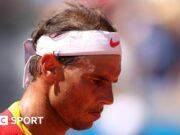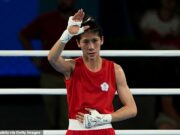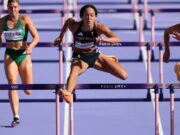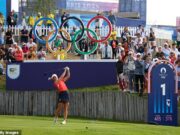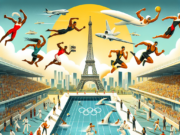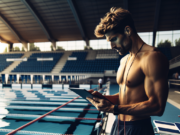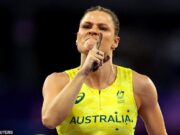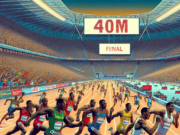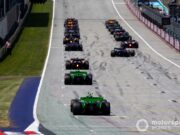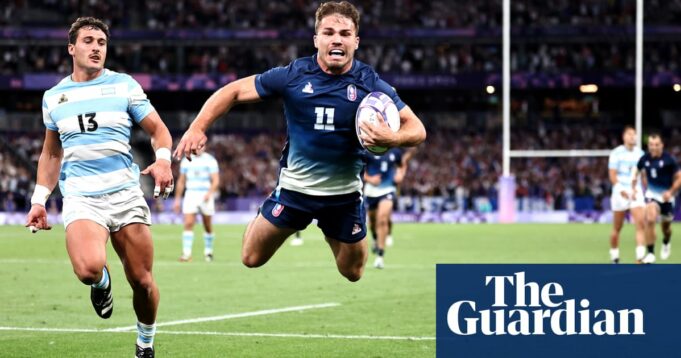Few rugby sevens matches can compare to the quarter-final clash between France and Argentina, and it’s safe to say there haven’t been many Olympic moments quite like it either. France emerged victorious with a score of 26-14, capped off by a stunning solo tap-and-go try from (who else but?) Antoine Dupont. Yet, it wasn’t just the action that defined this event; it was the electrifying atmosphere surrounding it. With 80,000 passionate French fans filling the Stade de France, their roars resonated throughout the city.
Unfortunately for the Argentine team, they faced backlash due to the racist chants directed at the French players during the recent Copa América. Every time they touched the ball, they were met with boos and jeers. Tensions between the two nations have escalated to the point where Argentina’s president, Javier Milei, has planned a meeting with Emmanuel Macron in Paris this weekend to discuss improving relations.
However, this was the last thing on the minds of the French players and their fans on Thursday night. Instead, they proudly sang La Marseillaise as their team raced to a 21-0 lead. Andy Timo scored their first try, followed by a remarkable double from the lightning-quick Aaron Grandidier Nkanang. Although Great Britain’s men didn’t qualify for the tournament, Grandidier Nkanang has English roots, having been born and raised in London and even playing for the English Counties U18 team before relocating to France.
Argentina managed to score early in the second half, but momentum swung in their favor when France’s Jordan Sepho received a yellow card. After Argentina scored again, the gap was narrowed to just one try. Nevertheless, Dupont asserted his prowess, expertly guiding his team down the field and sealing the victory with a try right after the buzzer. France’s journey continues into the semi-finals on Saturday, where they will face South Africa.
Dupont made the switch to sevens on his own accord, driven by the thrill of competition and the chance for a medal. This two-year endeavor forced him to skip this year’s Six Nations while balancing his commitments with the sevens team around Toulouse’s run to a league and cup double. In that time, he helped France secure its first tournament win on the sevens circuit since 2005, despite not qualifying for the Tokyo Olympics. His familiarity with some players, such as captain Paulin Riva from his days at Auch, has been beneficial.
If Dupont’s France hope to clinch the title, they must overcome Fiji, a team undefeated in Olympic play thus far. Over the course of the 2016, 2020, and the ongoing 2024 competitions, Fiji holds a record of 16 matches played and 16 matches won. During this stretch, no team has even come within five points of them—until Ireland fell in their quarter-final, losing 19-15 despite leading 15-7 at one point. Fiji proved unstoppable, scoring twice in quick succession to secure victory.
Fiji faced several challenges in the lead-up to the Games, navigating through recent turmoil with their former England player and coach Ben Gollings. After his departure in March, they appointed Osea Kolinisau, their Rio gold-winning captain, as his successor. Kolinisau’s first order of business was to reintroduce legendary 35-year-old Jerry Tuwai, who had previously been dropped due to fitness concerns. Kolinisau remarks that they are focusing on playing the “Fijian way: high tempo and high risk.” France played Fiji in the final group match, suffering a seven-point defeat.
after newsletter promotion
Fiji will face Australia, who triumphed 18-0 over the USA, while France is set to take on South Africa, who also faced jeers from the crowd. The Blitzboks claimed a narrow victory against New Zealand, finishing 14-7, largely due to the exceptional performance of their captain, Selvyn Davids, who not only scored a try by breaking two tackles but also assisted in another by sprinting the full length of the field.
Rugby sevens has often seemed like an unconventional addition to the Olympics. In Rio, it was staged in a makeshift venue constructed from scaffolding in a remote area outside the city; in Tokyo, it was played in an empty stadium, which proved disappointing for many. However, this edition in Paris has found its rightful place.







